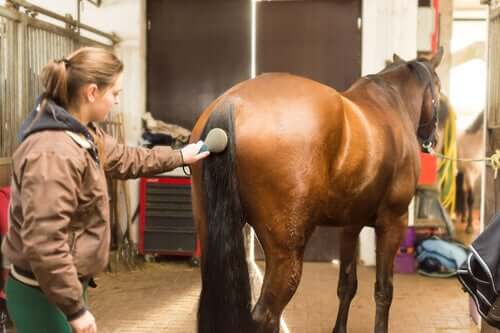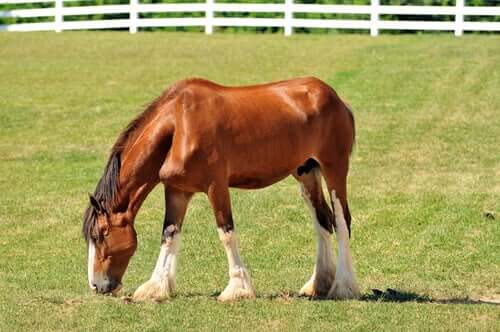Tips and Considerations Regarding the Breeding of Horses


Written and verified by the lawyer Francisco María García
As a business, breeding horses can be very gratifying both on an emotional and financial level. But you should always remember that it involves a large investment of time and money. To minimize mistakes, you really need to research the business and seek out good advice. In today’s article, we’ll provide some useful advice for getting into the breeding of horses.
Initial decision: What does the breeding of horses involve?
Starting up a business as an investment requires carefully scrutinizing the advantages and disadvantages. Breeding horses represents a tempting option for those who love these animals. Besides being excellent companions, horses are also valuable for shows, racing, and for helping with heavy labor.
In other words, there’s always a high demand for horses. However, the market has very high standards.

Points to consider
First of all, you need to know that the breeding of horses requires a hefty initial inversion as well as administrative knowledge. What’s more, it takes a great deal of dedication.
In order to care for horses, you need the right amount of adequate space, equipment, food, and plenty of time to dedicate to the task.
So before you take a leap into the world of horse breeding, you need to ask yourself if all of this is within your reach.
Getting to know the business
At the same time, it’s crucial that horse breeders know about horses, their behavior, and what they need. Ideally, you should have previous experience with these animals and their world. This includes knowing how to guide them, how to groom them, how to recognize if they’re sick, etc.
If you’re lacking this knowledge and experience, then you’ll need to start learning right away. Visit other breeders, do your research, etc.
The breeding of horses: How to get started
Setting up a suitable space
In order to get started, you need to have plenty of open space. Horses need a lot of room to run, and you’ll need to have separate spaces for mares and stallions.
Ideally, you should already have a space that can function as a stable. Other factors to consider are access to water and electricity in the area.
Also, you need to locate a plot of fertile land where you can plant hay to feed your horses. What’s more, you’ll need to make sure there are no toxic areas that could lead to health problems in your animals.
Equipping the breeding area
Before you get into the breeding of horses, you’ll need to build a barn and stables for your animals. When doing so, be sure to keep the climate conditions of your area in mind. Also, make sure the spaces are high enough and large enough for horses.
You’ll also need to set up good quality fences and gates to keep your horses from escaping or getting injured. These can be wooden or electric, but you should never use barbed wire as this is extremely dangerous.
Acquiring horses
- Look into the different breeds of horses and what care requirements each particular breed has
- Find out what breeds are most in-demand in your area and what buyers want them for
- Observe the dynamics of buying and selling and find out current market prices
- Remember that racehorses are the most expensive and require someone that possesses knowledge on the subject.
- Make sure that the animal is registered and has a good lineage. This should appear in the contract.
- Getting a stallion is a good option for mating with mares in the future.

Food
Knowing what the animal’s current diet is is important before bringing your horse home. Then, be sure to follow this same diet for several days after your purchase. This will help your horse in the transition process and help prevent possible digestive problems.
The basis of a horse’s diet is fodder, good quality hay, and some mixes–like alfalfa, oats, and wheat.
Certain supplements, like grains, are good for increasing a horse’s energy levels.
However, in order to determine the best diet for your animal, it’s best to consult with a veterinarian that specializes in horses.
Care and reproduction
The daily care of horses requires more than food and proper hygiene. Horses also need physical exercise. Therefore, you should ride your horse and give it a run in order to maintain good health.
When it comes time for mating, it’s always best to have your own stallion. When your mare is in heat, you should mate her with a stallion of good pedigree. In these cases, thoroughbred horses and those with a good build are best.
You should always mate animals that share similar characteristics. In other words, they should be close in size in order to avoid producing foals with malformations.
Continuing the process
Once you’ve set up your structure, it’s important to domesticate your foal and continue your business cycle. To do so, keep reproducing, training, selling, and caring for horses.
Promotion
Last, you need to get the word out and promote your business in order to attract buyers:
- Demonstrating and publishing the achievements of your establishment will give you more opportunities.
- Create an image for your business, a name, and a website where you can post useful and important information about the breeding of horses.
This text is provided for informational purposes only and does not replace consultation with a professional. If in doubt, consult your specialist.